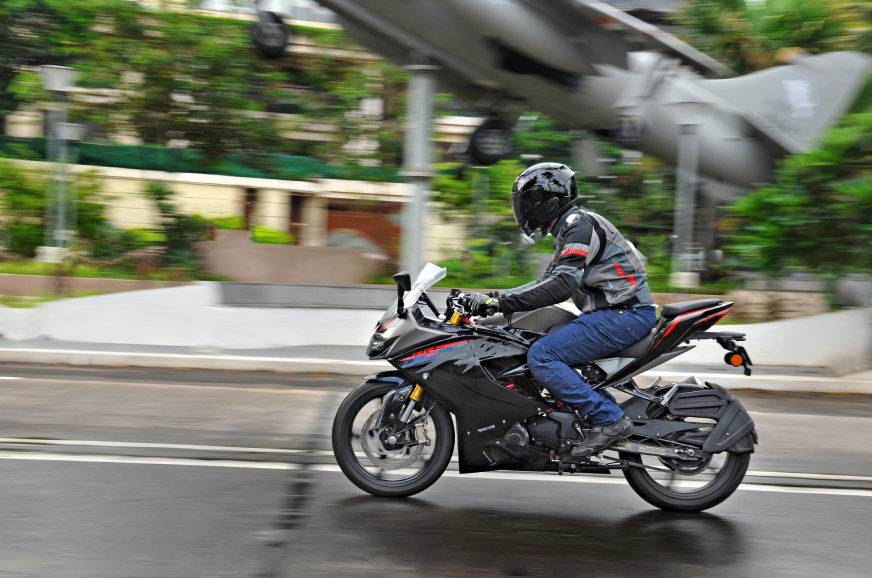
Our first experience with the 2020 Apache RR 310 on the racetrack made it quite clear that the update isn’t limited to just emission regulation. TVS has gone back to the drawing board, as far as tech is concerned, while also fixing some of the original bike’s flaws. In this road review, we find out just how usable the new tech is, and whether the updated RR makes for a better package.
Head Turner
The only big cosmetic change for 2020 is the new colour scheme. Getting a dual-tone colour scheme right is quite tricky, but TVS has managed to do so with the new ‘Titanium Black’ option. The more elaborate decals also help the RR 310 grab even more attention than before. The keen eyed among you will also notice that the inner bits of the fairing are now painted in gloss black as opposed to a regular plastic finish. While it’ll require a little more effort to keep clean, it does look quite premium.
Processing Power
What might not look that different at first glance is the instrument cluster, but this time around it’s an all-new 5.0-inch TFT display. Start the bike up and you are greeted by cool animations, including the start lights from a racetrack. The display is loaded with information and even supports Bluetooth connectivity that further unlocks more features like navigation, ride statics and more. The new Apache also has four different layouts that change with the riding mode you’re in; this and the fact that it has riding modes, is something I never thought I’d see on a motorcycle at this price point.
Ride on
Speaking of riding modes, this tech has come along with a new ride-bywire throttle system. The RR 310 has a total of four riding modes – Rain, Urban, Sport and Track. These modes offer different setups, based on the engine power/response and ABS. In Rain and Urban modes, you get a duller throttle response, an 8.2hp/2.3Nm drop and a rev limiter set at 9,000rpm. In Sport and Track modes, meanwhile, power and torque aren’t limited, and the rev limiter is set at 11,000rpm.
There’s no doubt that the throttle response is more immediate in the more powerful modes. While that can prove to be fun at times, it’s a little too aggressive in the city. Rolling off the throttle in these modes also results in a choppy power cut. On the other hand, the Urban and Rain modes helped reduce the sharpness of the throttle but sedate the RR 310 quite a bit. What I was left longing for is a mode that sits somewhere between the dull Urban mode and the over responsive Sport mode. To give you an idea of what the difference looks like in terms of numbers, 100kph comes up in 7.1sec in Sport mode and in 9.76sec in Urban mode. Its time in Sport mode is also just 0.2sec slower than its BS4 counterpart, a difference so small, it could just as well be down to the tester’s hands or different weather conditions.
The RR 310 continues to shine when it comes to its performance as a whole. The power delivery from the 312.2cc engine is linear and it keeps gathering speed almost up until the redline. What also contributes quite significantly to the performance is the low 174kg kerb weight. For reference, it’s 6kg lighter than the naked Bajaj Dominar 250.
TVS has also worked on reducing the vibrations and while they have made quite an improvement, there is no escaping from the fact that this is not a highly refined engine. The clip-on handlebars are now decently isolated from vibrations, but a buzz can still be in the seat and foot pegs, although it stops short of being too intrusive.
Aim and shoot
While the likeable chassis remains identical to the older model’s, the 2020 RR 310 rides on new Michelin Road 5 tyres. Grip levels were impressive on the racetrack, and they managed to provide a similar experience on the road. Not only are they stickier than before, but these tyres are quicker to turn in, resulting in a more flickable motorcycle. As far as braking is concerned, the RR’s setup is good, but is neither as sharp nor as strong as the KTM RC 390’s.
End result
The TVS Apache RR 310 was always a well-rounded motorcycle and the new update has only strengthened its case. Yes, it isn’t perfect, but it’s a motorcycle that can be ridden to work, to the racetrack, and even on the racetrack. Furthermore, it has the road presence of bikes with double the engine capacity. At Rs 2.45 lakh, it’s now only around Rs 8,000 cheaper than the more powerful RC 390, which is hard to justify based on specifications alone. Choosing between the two is to decide between ultimate speed and performance or more usable road manners and an impressive feature set.











0 komentar:
Post a Comment